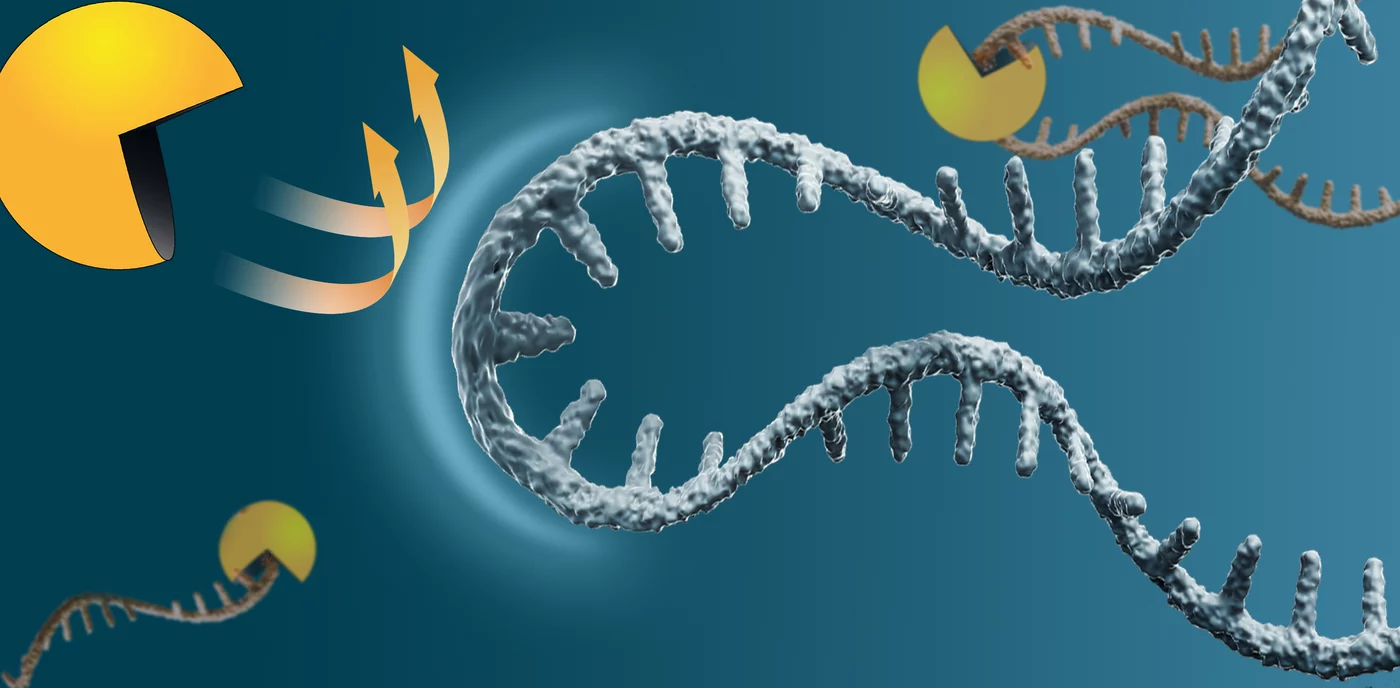mRNA-based vaccines and treatments bring new hope in the fight against incurable diseases. While targeting and destroying disease-causing mRNA is a common strategy in mRNA medicine development, stabilizing beneficial mRNA remains a significant challenge. Achieving both effectively is still a complex task in this field.

Messenger RNA (blue) is protected from degradation (yellow). Image Credit: Max Planck Institute of Molecular Physiology
This challenge has now been addressed by Peter’t Hart’s team at the Max Planck Institute of Molecular Physiology's Chemical Genomics Centre. The researchers developed the first active compound that prevents mRNA degradation by blocking deadenylation. This breakthrough could pave the way for new mRNA-based therapies and offer tools to investigate the mRNA degradation process further.
mRNA carries essential cellular instructions—the chemical blueprint for protein synthesis—from the nucleus to the cytoplasm. Once mRNA reaches the cytoplasm and completes its task in the protein production factories, it is broken down by exonucleases.
The length of time mRNA remains in the cytoplasm, whether promoting health or causing disease, directly influences the amount of protein produced. Controlling mRNA levels is one of the most promising strategies in the emerging field of RNA-based therapies.
How to Protect the Messenger
Peter 't Hart’s team has developed an innovative method to extend the lifespan of mRNA by preventing its degradation. mRNA is naturally unstable and would break down rapidly if not protected by molecular caps on both ends. At the 3' end, mRNA is shielded by a polyadenine tail, typically about 200 nucleotides long.
Despite this protection, mRNA’s defense is short-lived, with an average half-life of just seven hours. The degradation process, called deadenylation, occurs when RNA-binding proteins recruit the CCR4-NOT complex, which removes adenines from the mRNA one at a time. This is where the scientists’ new approach comes into play.
They have designed a large peptide that mimics the structure of the mRNA-binding protein to prevent the CCR4-NOT complex from interacting with the target mRNA. However, large peptides face challenges in crossing cellular barriers, a key hurdle in their use as medications.
By revealing the 3D structure of the peptide inhibitor bound to the target, the chemists were able to make modifications that improved the peptide’s ability to permeate cells, making it more effective for therapeutic use.
Increasing the Stability of Potentially Health-Promoting Proteins
The scientists advanced their research further by demonstrating the effectiveness of their strategy in cellular assays. The peptide treatment of cells stabilized the polyadenine tails of two prospective health-promoting proteins: a nuclear receptor, whose elevated levels may aid in the treatment of several age-related disorders, and a tumor suppressor, which may be helpful in the treatment of cancer.
The concept of stabilizing beneficial mRNAs by blocking their deadenylation has not yet been explored. Since almost all mRNAs undergo this process, blocking them can be used to develop new drugs that offer a new way to treat diseases where other strategies have failed.”
Peter’t Hart, Chemical Genomics Centre, Max Planck Institute of Molecular Physiology
Currently, his team is developing additional inhibitors to target various parts of the deadenylation mechanism.
Source:
Journal reference:
Pal, S., et al. (2024) Stapled Peptides as Inhibitors of mRNA Deadenylation. Angewandte Chemie International Edition. doi.org/10.1002/anie.202413911.